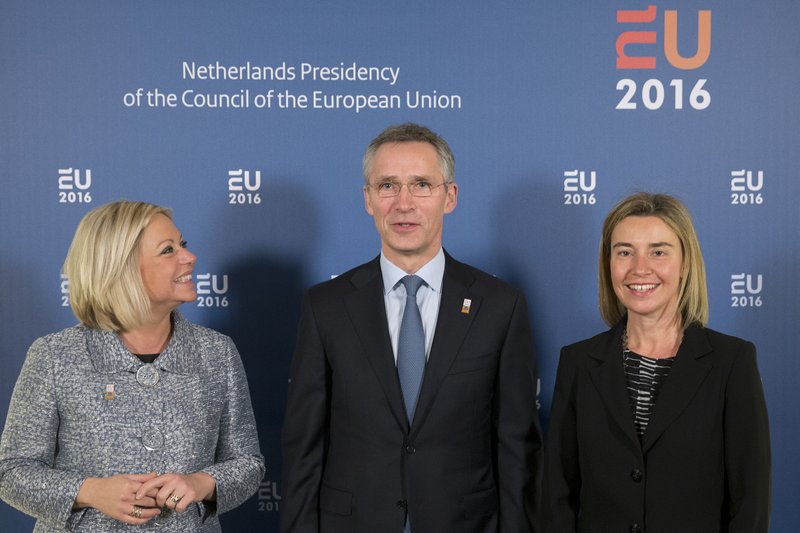AMSTERDAM -- European Union defense ministers met Friday with NATO's secretary-general to discuss closer cooperation between the military alliance and the 28-nation bloc to tackle looming threats to the region.
The EU and NATO are working to beef up their responses to Russia's increased military activity to the east and the threat of the Islamic State extremist group in violent conflicts in the Middle East and Libya.
"It is clear that no member state will be able to face" these challenges on its own, Dutch Defense Minister Jeanine Hennis-Plasschaert said after the meeting.
"There is war out there," Hennis-Plasschaert added. "Nobody can deny it, and we cannot continue writing papers; we have to act."
Foreign ministers joined their defense colleagues for lunch to discuss a united front in defense and foreign strategy that is likely to be presented to EU leaders in June.
Ahead of the meeting, NATO Secretary-General Jens Stoltenberg welcomed President Barack Obama's administration's announcement this week that it will propose quadrupling spending on its troops and training in Europe as part of the U.S. military's accelerating effort to deter Russia after Moscow's annexation of Crimea and incursion into eastern Ukraine.
Stoltenberg called the U.S. move "an important sign and part of the adaptation of the alliance to a more demanding security environment."
The NATO chief said the alliance is closely monitoring developments in Libya amid reports that the Islamic State, also known as ISIL, is gaining strength there. Libya has been split between two rival governments since 2014, a consequence of the chaos that engulfed the country after a 2011 uprising that toppled and killed longtime dictator Moammar Gadhafi.
"This just underlines the importance of fully supporting efforts to find a political solution, to reach a cease-fire and to have an agreement on a unity government in Libya," Stoltenberg said. "Because that will be an important first step, also to be able to fight ISIL."
Meanwhile, the Obama administration is proposing a $3.4 billion initiative to boost military spending in Europe next year to stockpile heavy weapons, armored vehicles and other military equipment in eastern and central Europe
The proposal permits the Pentagon to keep the equivalent of a 4,000-troop armored brigade in Europe at all times on rotational deployments, though no troops will be formally based there, officials said.
"We asked for the amount we think we'll need" to counter "the Russian challenge in Europe," Defense Secretary Ashton Carter told reporters Wednesday during a visit to a naval weapons research facility in China Lake, north of Los Angeles.
The proposal, part of the Pentagon's $583 billion budget request, must be approved by Congress. The administration is expected to unveil the budget next week.
"We're reinforcing our posture in Europe to support our NATO allies in the face of Russia's aggression," Carter told the Economic Club of Washington on Tuesday. "We haven't had to worry about this for 35 years, and while I wish it were otherwise, now we do."
The Pentagon plans to construct or refurbish maintenance facilities, airfields and training ranges in seven European countries: Bulgaria, Estonia, Germany, Latvia, Lithuania, Poland and Romania. All are members of the NATO alliance.
None of the money requested by the White House is earmarked for Ukraine, which is not in NATO.
Information for this article was contributed by Mike Corder of The Associated Press and by David S. Cloud of Tribune News Service.
A Section on 02/06/2016

